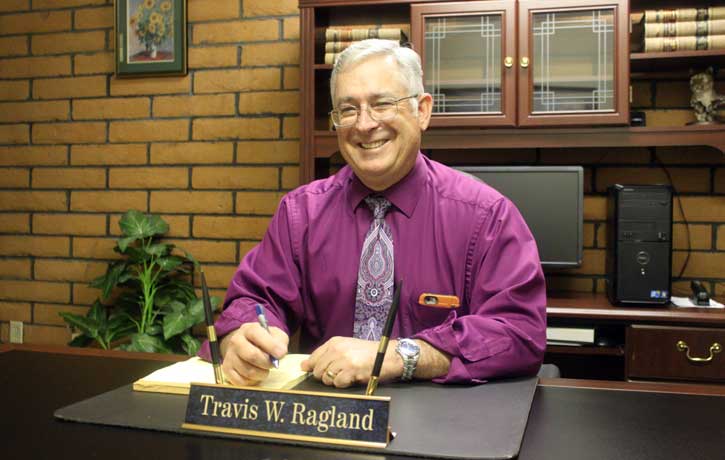Jon Johnson File Photo/Gila Herald: Former Thatcher head football coach Sean Jacob Hinton was sentenced to 11.25 years in prison on Wednesday for dealing fentanyl. Pictured is Sean after a game in 2017.
By Jon Johnson
We are not sentencing the defendant for an addiction. We are sentencing him because he was selling poison in our community.
Graham County Attorney L. Scott Bennett
SAFFORD – Former state-championship-winning Thatcher football head coach Sean Jacob Hinton was sentenced Wednesday to spend the next decade of his life behind bars.
On Wednesday, Graham County Superior Court Judge Pro Tem Travis W. Ragland sentenced Sean Hinton to 11.25 years in prison. Hinton previously pleaded guilty on Feb. 13 to an amended count of attempt to commit the sale or transportation of narcotic drugs – a class-3 felony and possession of narcotic drugs – a class-4 felony. His plea agreement called for a sentence between 7.5 and 15 years.
The charges come from multiple cases, including selling fentanyl to an undercover Arizona Department of Public Safety officer.
Sean was on probation when the new charges arose from a 2020 conviction that cleared up three other cases that included drug and shoplifting charges. His one-year prison term at that time was set to be followed up with a three-year probation term after he completed a drug treatment program.
Sean Hinton was Thatcher’s head football coach from 2015-2018, winning back-to-back 2A state championships in 2016 and 2017. In July 2018 he was removed as Thatcher’s head football coach.
Several relatives and friends spoke on Sean’s behalf, including his father, Terry Hinton, niece, Cassidy Crosby, brother, Brad Hinton, fellow football coach Ramon Morales, and former Graham County Superior Court Clerk Darlee Maylen, who is the grandmother to two of Sean’s sons.
“When Sean is right there’s not a finer person around,” Terry Hinton said. “He’s had such a positive influence on the kids he’s coached – the people he’s been around.”
Terry said Sean has been helpful to other inmates while incarcerated and believes he can make a positive mark on society.
“He’s an addict and he always will be,” Terry said. “And he’ll have to fight that the rest of his life. In this past year, I’ve seen a change in Sean from what I saw before and I truly believe that he is – decided that he needs to straighten up . . . Everyone in here is here to support Sean. When he gets out, there’s not anybody in here that won’t do everything they can to keep him going the way he needs to go. Like I said, he’s always going to be an addict and he’s always going to have that battle with those demons, there’s no doubt. It will always be there but he’s got a lot of people here to help him and I think when he gets out he’ll do that.”
Morales said several former players have spoken to him about the positive influence Sean had on their lives.
“He had the knack for getting people involved with the program – making it a community and school-wide thing,” Morales said. “He did some things that brought Thatcher football to the forefront. We accomplished something that has only been done once before that was winning three state championships in a row. It broke my heart to become the head coach that third year, but as I told him after the game, it was really his doing and I just kind of kept it going. As I said before, I think the positive influence that he had on so many young men – young men that have come back and talked to me and told me that when things get hard they remember the lessons that they learned from coach Hinton and from my football program.”
Graham County Attorney L. Scott Bennett prosecuted the case and said that despite the good Sean had done for those in the community, to maintain a law-abiding society the court has to treat everyone equally whether it be good or bad.
“In fashioning not only a plea agreement but a recommendation for this case, what I’ve done is try to take the aggravating and mitigating factors as they are known to me (and) compare them to what this court and other courts in Graham County have done in the past and come up with what I think is a fair sentence,” Bennett told the court.
“I do not envy the position the court is in because no matter what sentence you impose there’s going to be a segment of our community who is going to be concerned that the prosecutor and the court did the defendant wrong that because of who he is and his – I don’t know if celebrity is the right word – but the fact that he’s known in the community, we hit him extra hard. And regardless of what that sentence is, whatever it is, there will also be another segment of the population for the exact same sentence who say ‘oh’ look at him he got away with it again.’ So, that’s why I think consistency is so important.”
Bennett then recommended Judge Ragland sentence Hinton to 13.5 years, due to mitigating factors provided to him by Terry Hinton and Maylen. He reiterated that the state wasn’t sentencing Sean because he was addicted to drugs but because he was selling them.
“We are not sentencing the defendant for an addiction,” Bennett said. “We are sentencing him because he was selling poison in our community . . . In my mind there is no worse substance that you can sell than fentanyl . . . Anytime you take this poison it is literally taking your life into your hands and that’s why we are prosecuting him. Not because he was addicted but because he was making money selling this garbage.”
Josi Lopez represented Sean for his defense and requested Judge Ragland give Sean the minimum sentence allowed under the plea agreement of 7.5 years. She said he has spent the last year in jail improving himself and others.
“What better example for his boys, for his family, for the community to say he’s owning up to his accountability and that he’s making the best of the situation instead of just blowing it all off,” she asked.
Lopez added that Sean was taking classes working toward his goal of becoming an addiction counselor and helping those in need.
“The past few years in Sean’s life do not depict the person that he was before he started his addiction, and it started with prescription pain meds,” Lopez said. “And yes, he’s here in front of the court for selling drugs, but he was still using at the same time judge, none of that went away.”
Sean Hinton spoke to the court on his behalf and said he intended to help others and give back to the community upon his release.
“I don’t consider myself a drug dealer,” Sean told the court. “I know I messed up and that’s what I’m here for but I was a drug addict supporting my habit . . .”
In a letter he read to the court, Sean said he didn’t consider himself to be arrested but rescued instead.
“I was rescued from a pit of despair out of the mud and the mire and he set my feet upon a rock and steadied me as I walked. He has given me a new song to sing, a hymn of praise,” Sean paraphrased Psalm 40:2.
“I am not a bad person,” Sean said. “I am a father, a son, a brother, and a friend who unfortunately suffers from the disease of addiction. However, I will not let my trials and tribulations be for nothing. I am going to devote the rest of my life to using my own experiences to help others win their battles with drug addiction and one day hope to be able to give back to this community that has done so much for me.”
Before presenting his sentence Judge Ragland took the time to address Sean’s earlier statement.
“Whether you thought you were a drug dealer or not, once you sold those drugs you have no control over where they went. Those drugs could be going to people you coached, they could be going to people’s kids, they could be going to people’s mothers and fathers, those pills could have found their way to your children. And there’s nothing you can do about that once you sold those pills. There are people dying in this county on a regular basis because of those pills.”
Judge Ragland called the sentencing the hardest one he’s had in his six years on the bench as he had to way the extraordinary aggravators and mitigators.
“The two most troubling things about this is one when you’re doing what you’re supposed to do, you’re a positive influence and you affect a lot of lives in a very good way. And so, again it makes it difficult. I don’t have someone in front of me who is a monster and if I do it’s easy – I don’t have problems. But that’s not what I have here. So what I have is I have someone who has a lot of potential – can do a lot of good who’s basically going to be sidelined for a significant period of time because of that. The other thing that I find the most troubling is almost every person out there (in the courtroom) sitting there thinking ‘What could I have said; what could I have done; how could I have kept him from doing this; how could I have helped him succeed’? And I’ve been doing this a long time. There’s nothing any of them could have said; there’s nothing any of them could have done that would have kept you from sitting right here. The problem is, they’re not going to believe me when I say that. And if you tell them that they’re not going to believe you either. So, they’re going to have to deal with the guilt that they shouldn’t have to deal with because they care about and love you. Those are the two things that I find the most troubling about this entire thing.”

Judge Ragland then sentenced Sean Hinton to 11.25 years in prison on the amended count of attempt to commit the sale or transportation of narcotic drugs – a class-3 felony and 4.5 years to be served concurrently (at the same time) on the charge of possession of narcotic drugs – a class-4 felony.
Judge Ragland also ordered Sean Hinton to be reinstated on his earlier probation without any additional prison time but an extension of the probation for just more than a year.
Sean will be eligible for one day off for every seven served and was given credit for 370 days already served. That means he could be eligible for release in early 2033.











